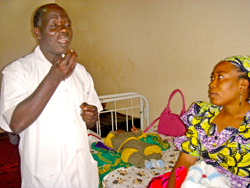You are here » Home » Telling Our Story
Success Story
Health care providers and communities work to save women’s lives
Combating Maternal Mortality

| |
Photo: JHPIEGO/Emile Mboudou
|
|
A training exercise in Ngaoundere. A health care provider, left, practices communications techniques on a mock patient.
“Before our training we did not know how to detect when our wives were having complications of pregnancy. Now we know what to look for. Also, our wives say that they are being treated better by the staff when they go to the clinics for visits and for treatment,” said a community health volunteer.
|
Maternal mortality rates in West Africa are among the world’s highest. Too often, pregnant women are unable to access quality prenatal and delivery services, with tragic consequences. Even when delivery services are available, traditional practices and lack of training in advanced medical procedures limit the services women can access at critical moments. To combat these problems, USAID has partnered with the Ministries of Health and UNICEF in Cameroon and Mauritania to support a community-based maternal and neonatal health care model.
The model focuses on mobilizing communities and strengthening facilities. Community leaders and health care workers are trained to plan and conduct information and advocacy activities that teach women, families, and communities how to detect and confront warning signs of complications in pregnancy. The communities are equipping themselves with the resources to assist women who need these services. USAID is strengthening the skills of health service providers — doctors, midwives, and birthing assistants — and helping facilities install new equipment. Providers from facilities working with USAID meet regularly with community leaders and health workers to strengthen links between facility staff and the communities they serve.
In Ngaoundere, Cameroon, and Kaedi, Mauritania, USAID and UNICEF have worked together to train more than 40 doctors, midwives, and birthing assistants in delivery and newborn care. Through training, health care providers learn to communicate better with patients, manage the third and final stage of labor when complications for the new mothers often arise, and prevent infection.
By providing training and state-of-the-art medical equipment, USAID and UNICEF are helping to ensure that mothers and expecting mothers who come to these facilities receive quality maternal and neonatal services.
Print-friendly version of this page (506kb - PDF)
Click here for high-res photo
Back to Top ^ | 

